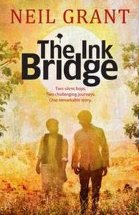The ink bridge by Neil Grant

Allen and Unwin, 2012. ISBN 9781742376691.
The violent oppression maintained by Moslem extremists in
Afghanistan is revealed in Neil Grant's depiction of a young boy's
desperate flight from the Taliban. Omed does what he can to provide
for his family who live a hopeless existence in miserable squalor
until he enrages the vicious stand-over men who terrorise his
locale. Knowing he will be murdered, Omed flees his village and
journeys to Pakistan where he endures months of privation until
fortune delivers an opportunity to undertake the long and dangerous
voyage to Australia.
Mandatory detention at Woomera follows his arrival, until a breakout
loosely based on real events sees him escape to try to live in the
community without official sanction or the rights and protection
afforded by citizenship.
In Melbourne, Hec, a young Australian man suffering from a family
trauma meets Omed whilst they perform unskilled factory work and the
pair develop a relationship partially based upon the silence they
both maintain for different reasons.
Grant graphically illustrates the plight of those who take enormous
risks to seek the safety of life in Australia. The reader is
transported to a world of corruption and greed where those who
profit from human misery demonstrate a casual disregard for the
suffering of those they exploit. I admired the way the writer
presented a balanced and realistic view of the asylum experience.
Whilst he unashamedly detailed the mental illness, self harming and
hopelessness caused by long term detention, one of his main refugee
characters was a morally bankrupt, evil criminal, - exactly the sort
of individual whose identity and background authorities try to
establish via detention.
The question of why so many unaccompanied men feature in the asylum
seeker population is dealt with by the author in a brave manner
which does not shy away from the harsh realities of life under a
brutal regime perpetuated by bloodthirsty tyrants demonstrating
moronically dogmatic religious intolerance. Grant does not attempt
to excuse or misrepresent reality for those trying to survive in a
land where some lives have no value and he certainly does not insult
the reader with happy resolutions for the helpless innocents left
behind by those who flee.
The writer's personal experience in Afghanistan and level of
research into human trafficking is evident in the text, however I
thought that presenting the two boys with their disparate
backgrounds and trying to meld them into a larger story was just a
little too much to handle in this novel. An unresolved climactic
event at the factory, unconvincing Woomera content and a laughably
bad depiction of an Australian truck driver were also elements I
cannot help recalling which reduced the overall impact of this
otherwise good story.
Rob Welsh